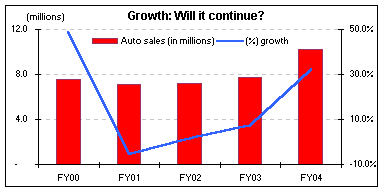
| 
Home > Business > Business Headline > Report
CRR: What's the impact?
September 14, 2004 13:08 IST
Reserve Bank of India's weekend decision to hike the cash requirement ratio in two fortnightly tranches of 25 basis points each to increase it to 5 per cent comes as a little surprise, given the high liquidity in the economy and the rising inflation. To put things in perspective, inflation, as per the government's CMP was targeted to be arrested at nearly 5 per cent. But currently hovering at over 8 per cent, some steps were needed to be taken and this move comes as the first in some more to come. Last week, the government announced that CRR would be hiked from the current 4.5 per cent levels to 5 per cent in two fortnights starting from Sept 18. Further, the interest payable on the CRR deposits held by the RBI would be reduced from the current 6 per cent (bank rate) to 3.5 per cent. Although banks have refrained from giving clear signals of a possible rate hike,it is likely that the industry witnesses some northward shift in lending rates in the foreseeable future. Let us now analyse the impact of a possible rate hike on India Inc.: Banking: During FY04, banks witnessed robust treasury incomes. During the year, low credit offtake from the industry and soft-interest rate regime compelled banks to park idle cash in government bonds and CRR over the statutory limits to reap in attractive returns.However, the RBI move would suck out liquidity to the tune of Rs 8,000 crore (Rs 80 billion) from the system and at the same time reduce its interest outgo towards banks (as interest on CRR maintained). This is because the RBI has also reduced the rate of interest on CRR from 6 per cent to 3.5 per cent. Earlier, banks would park in idle cash at the repo auctions. However, with the rise in CRR, the idle cash is likely to reduce, thereby eating into the treasury returns. However, a hike in interest rates is not ruled out after this move. But for competition, the country would surely witness a rate hike.
- Inflation affecting banks
| Other income (Rs m) | 1QFY04 | 1QFY05 | (%) Change | | SBI | 17,529 | 15,387 | -12.2% | | Oriental Bank | 1,817 | 998 | -45.1% | | Corporation Bank | 1,257 | 1,001 | -20.4% | | HDFC Bank | 1,322 | 1,080 | -18.3% | | IDBI Bank | 428 | 417 | -2.6% | | UTI Bank | 1,503 | 1,101 | -26.7% |
* Source: Equitymaster Research
Capital goods industry: The last three years' soft interest rate regime had a positive impact on India Inc as the industry witnessed lower interest outgo and also cost cutting, which made the Indian markets attractive in the global arena. As a result of low interest rates, companies undertook large capital-intensive projects. However, with an upward shift in interest rates, it is likely that major projects with a positive internal rate of return turn negative as cost of financing goes up. This move would hit the long-term profitability of the industry as major corporates would either postpone or cancel orders.
Auto industry: Retail loans form a major part of a bank's loan portfolio. To put things in perspective, more than 80% of vehicle sales are financed by the banking industry. A hike in interest rates is likely to affect this price sensitive segment. Further, material cost increase on account of rising working capital costs would have negative impact on margins. Also, the plans to project the country as a manufacturing hub would take a hit in the face of rising interest rates where financing activities would become costlier. Further, with intense competition, aggressive pricing is the order of the day.
 Infrastructure: The country's budget has laid special emphasis on infrastructure activities with over Rs 400 bn being earmarked for the same. Large construction activities coupled with agricultural projects (irrigation) shall result in high costs. A hike in interest rates would result in postponement of these plans. This is likely to impact companies catering to the infrastructure segment such as steel, cement and energy. Power projects, which are capital intensive, are likely to be worst hit in the face of rising interest rates as usually, high gestation periods in the segment attract relatively higher costs.
We believe, interest rates are not likely to move up substantially in the short-term as there is still substantial liquidity in the banking system, resulting in excess cash for lending. To put things in perspective, the banking system continues with excess liquidity. On the consumer side (retail borrowers), a small hike in interest rate might have a 'sentiment' effect rather than impacting demand for housing and car loans in the long-term. All in all, the global economic recovery has been wavering as a result of rising crude oil and commodities prices and as a result, interest rate hike would further affect growth. All these factors would continue to dominate any decision regarding interest rates. Investors thus need to exercise caution. Equitymaster.com is one of India's premier finance portals. The web site offers a user-friendly portfolio tracker, a weekly buy/sell recommendation service and research reports on India's top companies.
| 
| 
 | Article Tools |  | |


 | Related Stories |  | |




| |
|